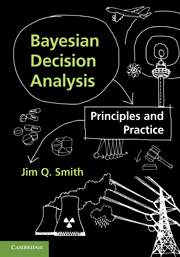Book contents
1 - Introduction
from Part I - Foundations of Decision Modelling
Published online by Cambridge University Press: 05 June 2012
Summary
Prerequisites and notation
This book will assume that the reader has a familiarity with an undergraduate mathematical course covering discrete probability theory and a first statistics course including the study of inference for continuous random variables. I will also assume a knowledge of basic mathematical proof and notation.
All observable random variables, that is all random variables whose values could at some point in the future be discovered, will be denoted by an upper case Roman letter (e.g. X) and its corresponding value by a lower case letter (e.g. x). In Bayesian inference parameters – which are usually not directly observable – are also random variables. I will use the common abuse of notation here and denote both the random variable and its value by a lower case Greek letter (e.g. θ). This is not ideal but will allow me to reserve the upper case Greek symbols (e.g. Θ) for the range of values a parameter can take. All vectors will be row vectors and denoted by bold symbols and matrices by upper case Roman symbols. I will use = to symbolise a deduced equality and denote that a new quantity or variable is being defined as equal to something via the symbol ≜.
Bayesian decision analysis and the scope of this book
This book is about Bayesian decision analysis. Bayesian decision analysis seriously intersects with Bayesian inference but the two disciplines are distinct.
Information
- Type
- Chapter
- Information
- Bayesian Decision AnalysisPrinciples and Practice, pp. 3 - 27Publisher: Cambridge University PressPrint publication year: 2010
